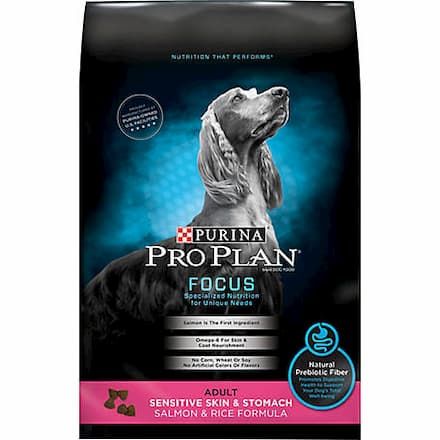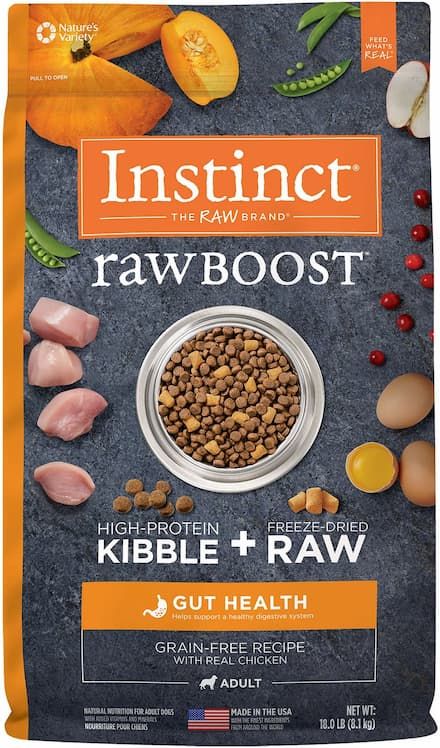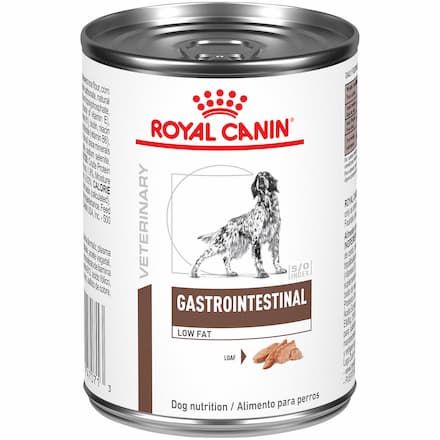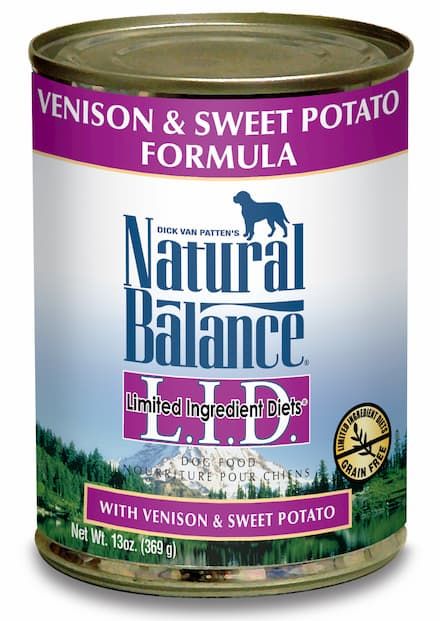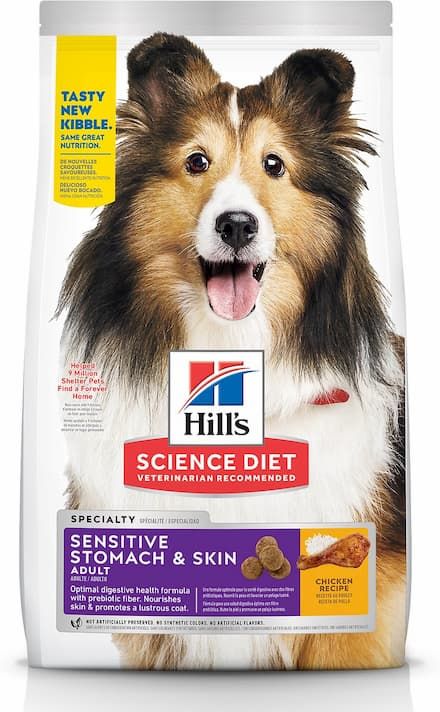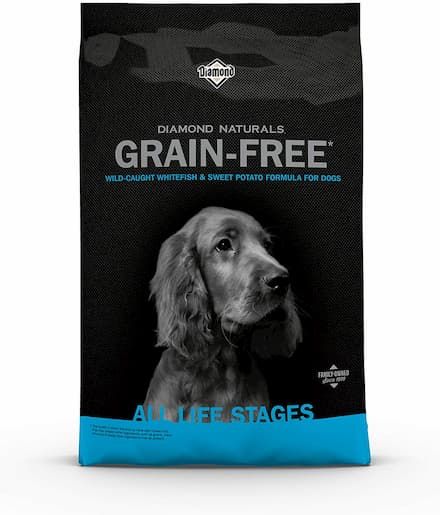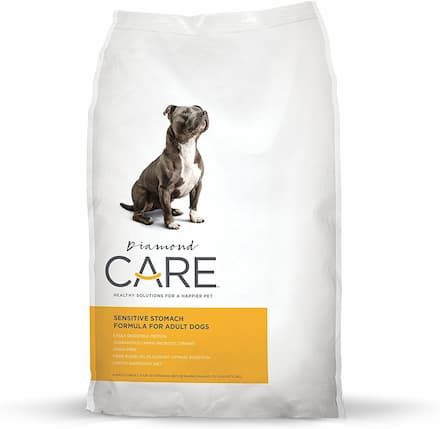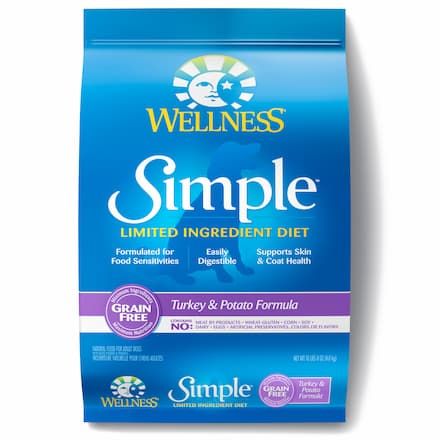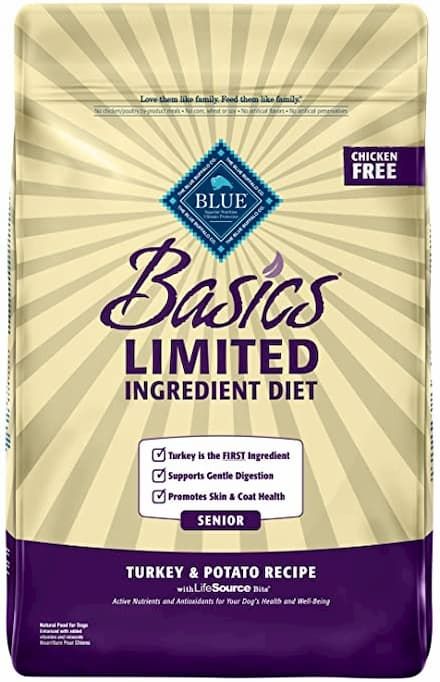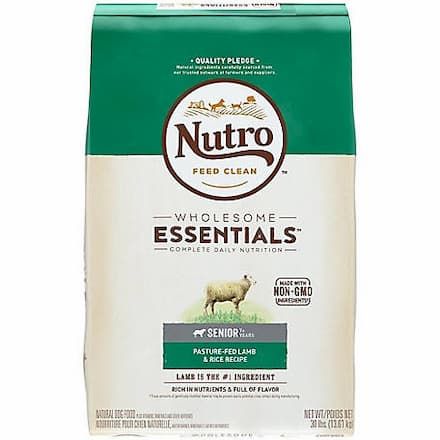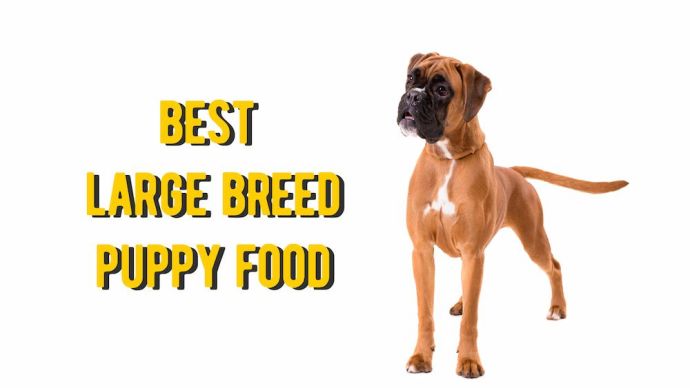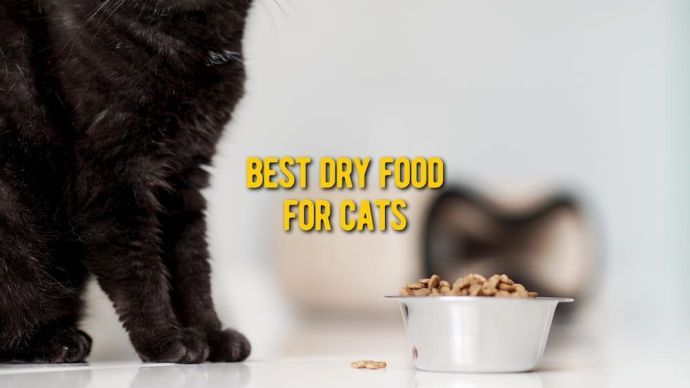The 10 Best Dog Food For a Sensitive Stomach (Vet Approved Review)
Written by:
Author: Casey Fenn
Casey Fenn has 3+ years of experience in writing content. He lives in western North Carolina with his wife, four children, and an assortment of farm animals — including a dog, twenty chickens, a handful of quail, and one milk cow. Casey specializes to write articles in Dog Care, Cat Care, and Tips for Aquarium Owners.
View all 10 articlesLearn about our editorial process and veterinary review board.
Reviewed by:
Veterinary review
by Dr. Chyrle Bonk
Dr. Chyrle Bonk is an associate veterinarian since 2010 and was a volunteer for Clearwater County Youth 4H. Dr. Bonk contributed to various animal and veterinary related websites and magazines as a way to help keep animals across the globe safe and healthy. When Chyrle not working she spends her time with her own furry crew of dogs, cats, and horses.
View all 10 articlesLearn about our veterinary review board
Viewed: 595
Updated on: 02/14/2023
A dog with chronic stomach issues can be no picnic, and their constant discomfort, vomiting, or diarrhea may have you looking for a treatment in the form of dog food meant for sensitive stomachs. To help you find your family friend some digestive relief, let’s take a deeper look into the world of sensitive stomach foods so that you can choose the right one for you and your canine companion.
Unfortunately, your dog isn’t going to come to you asking for a dose of Pepto-Bismol or Mylanta when their stomach is bothering them. Instead, it’s up to you to notice the sometimes subtle signs that your dog may be suffering from a sensitive stomach. Every dog experiences an upset stomach at times, and it’s just in their nature, especially if they’re prone to eating garbage, plants, table scrapes, or anything other than their dog food. However, an actual sensitive stomach is more of a chronic condition, which bothers them relatively frequently, if not continuously.
What Can Cause a Sensitive Stomach in Dogs?
The excellent treatment for your dog’s stomach’s rumbling and grumbling is finding the real reason behind it. Unfortunately, this isn’t always quickly done and will usually require your veterinarian’s involvement. Some primary causes of a sensitive stomach in dogs include dietary changes, gastrointestinal disease, and food allergies or sensitivities.
Dietary changes
Frequent switching of your dog’s food can cause an upset stomach. Your dog eats the same thing daily, and their GI system and microbiome get used to that food and become efficient at digesting it. Switching their food cold turkey can throw that efficiency and good gut bacteria for a loop, causing an upset stomach. If you’re changing food regularly without mixing the old and new and allowing their body time to adjust, they could experience the symptoms of a sensitive stomach.
If switching brands or even formulations of food, always allow at least a week to mix their old food with the new food. Gradually increase the new food each day until they eat only fresh dog food. Some dogs are so sensitive to switching foods that even different flavors can cause problems. We all want to provide our critters fulfilling life experiences rather than the same old, same old, but switching their food constantly isn’t the good way to do it.
Gastrointestinal diseases
Any disease that disrupts the digestive process can cause a sensitive stomach. Issues like inflammatory bowel disease (IBD), chronic pancreatitis, or pancreatic insufficiency [1] can show up as a sensitive stomach. These conditions affect how a dog digests and absorbs food and can lead to abdominal discomfort, vomiting, diarrhea, and other signs. They can also be treated, in part, by a sensitive stomach diet.
Food allergies or sensitivities
Just like people, dogs can have allergies [2] or food sensitivities. The difference between an allergy and a sensitivity is the body’s response. Allergies elicit a full-on immune response, meaning inflammation and swelling, for example, swelling in the throat for people allergic to peanuts. A particular food ingredient’s sensitivity doesn’t involve the immune system but can still produce side effects, like gas and bloating in people with lactose intolerance. The most common food allergies in dogs happen to the proteins in their foods, mainly chicken, beef, and egg.
They can also be allergic to grains, dairy, or, less commonly, any other ingredient in their food or treats. An excellent way to determine food allergy or sensitivity is to do an elimination diet. When you feed your family friend a minimal ingredient to prevent providing allergen, you can add ingredients back in until your family friend starts having problems again. That will help you pinpoint what is behind your dog’s food allergies to avoid feeding it in the future.
They can also be allergic to grains, dairy, or, less commonly, any other ingredient in their food or treats. An excellent way to determine food allergy or sensitivity is to do an elimination diet. When you feed your family friend a minimal ingredient to prevent providing allergen, you can add ingredients back in until your family friend starts having problems again. That will help you pinpoint what is behind your dog’s food allergies to avoid feeding it in the future.
Dr. Chyrle Bonk, associate veterinarian
How to Choose a Dog Food for Sensitive Digestive Systems?
Now that you understand what a sensitive stomach looks like in dogs and its possible causes, it’s time to choose food to help decrease those symptoms. If only it were as easy as that. The following are characteristics to check off your list when looking at different sensitive stomach dog foods.
1. Digestibility
When feeding a sensitive stomach, you need something easy to digest above everything else. You don’t want to overwork that GI tract that is already on edge. So, what foods are easily digestible? Whole foods. We’re talking whole meats and grains. Meat by-products and meat meals contain organic meat, fat, and other edibles that may be good protein sources, but they also tend to be less digestible. Avoid fillers, such as soybean hulls, bran, etc., as these are almost entirely indigestible. Think bland, like chicken noodle soup, when you’re sick.
2. Fiber
Prebiotic fiber is an excellent addition to sensitive stomach dog foods that can help regulate your pooch’s digestive system. Fiber is essential to digestive health as it can help both diarrhea and constipation. Good sources of fiber in foods include green beans, pumpkin, wheat germ, apples, and carrots, to name a few. But, again, avoid those harsher fiber sources like hulls and bran.
3. Probiotics
If you know anything about gut health, chances are you’ve heard about the microbiome. This is a dog’s and human’s unique blend of good bacteria that inhabit their digestive tract. While you might not have realized there was such a thing as good bacteria, there are, and it can mean the difference between a chronically ill pup and a healthy and happy one. The microbiome is what is responsible for proper digestion and balance in GI, and they break down and create nutrients that are essential for all other bodily functions. If the microbiome isn’t happy, your dog isn’t pleased. Feeding supplemental probiotics can help keep that microbiome happy by fueling it and replenishing it with exactly what it needs.
4. Other extras
Added benefits to a sensitive stomach dog food include omega fatty acids and antioxidants to help relieve inflammation and repair cellular damage. These may come in the way of fish oils or blueberries or simply be added in with a synthetic supplement.
Dog Food for a Sensitive Stomach (Full Reviews)
We have collected the most suitable foods that will fuel overall well-being without upsetting his stomach.
1. Purina Pro Plan Focus Sensitive Skin and Stomach Salmon and Rice
Whether you’ve recently adopted a new puppy or are searching for better pet food for your aging, senior pet, Purina Pro Plan offers the options you need. Their experts have formulated a series of products that are designed to be easy on your dog’s stomach while offering the nutrients he needs to achieve optimal health.
This product is made with real salmon (and without any of the most common allergens), it’s one of the very best options if you have a pet with a sensitive stomach.
Also, it includes the protein, fiber, and fatty acids needed to make it easy on your dog’s stomach.
Pros
Cons
- It is made with real salmon as its first ingredient and without corn, wheat, or soy.
- Designed to provide the nutrition your pet needs for optimal health, no matter what its breed or stage of life.
- Some customers who have ordered through online retailers have complained about bugs in the bottom of their pet food bags.
2. Instinct Raw Boost Gut Health Dry Dog Food
Instinct’s Raw Boost Gut Health Dry Dog Food has been specially formulated with ingredients that are packed full of vitamins and minerals but won’t upset your pet’s stomach. This pet food is built on a foundation of cage-free chicken meat that’s been freeze-dried to maintain it’s naturally occurring flavor and nutrients.
It contains vegetables and fruits that offer your pet the antioxidants, omega-3 fatty acids, vitamins, and minerals he needs to experience long-term health.
Pros
Cons
- A grain-free option that’s designed to give your pet everything it needs to thrive without upsetting his stomach.
- Made with genuine freeze-dried raw chicken along with fruits and vegetables, for a balanced diet.
- It includes absolutely no grains, potato, corn, wheat, soy, or artificial ingredients.
- There have been reports from some pet owners that they had a difficult time getting their dogs to eat it without coaxing.
- Some have complained about the relative high price when compared to some brands.
3. Royal Canin Veterinary Diet Gastrointestinal Low Fat Canned Dog Food
If you’ve exhausted yourself searching for a canned dog food that won’t leave your pet’s stomach aching, look no further than Royal Canin Veterinary Diet Gastrointestinal Low Fat Canned Dog Food. This pet food has been formulated with the precise blend of nutrients, vitamins, and minerals your pet needs to maintain his overall health without struggling through an upset stomach after every meal.
It also supports your pet’s urinary health by eliminating any ingredients that contribute to crystal formation within the bladder.
Pros
Cons
- It is formulated with the prebiotics, omega-3 fatty acids, and dietary fibers needed for long-term digestive health.
- It is explicitly designed to help dogs who have trouble digesting fat, making it easier on your pet’s stomach.
- Supports a urinary health and ability to maintain a healthy weight.
- Because of the nature of this pet food, it requires veterinarian approval.
- Some pet owners have complained about unwanted weight loss after putting their dog on this product.
4. Natural Balance L.I.D. Limited Ingredient Diets
Natural Balance’s Limited Ingredient Diets canned option is specially formulated to be easy on your pet’s stomach. By severely limiting the number of ingredients in each can of food, they restrict the possible allergens or other upset digestive tract sources.
This food contains high-quality protein sources, limited carbohydrates, and no filler, they make it possible to give your pet a delicious meal that will contribute to his overall health without making the dog sick.
Pros
Cons
- Built on a foundation of high-quality protein sources such as beef, chicken, fish, and lamb.
- Includes limited numbers of carbohydrates and no artificial ingredients, so your pet can maintain a healthy weight.
- Available in a variety of formulas, including those designed for every stage of life.
- Some pet owners have complained about recent cans containing an undesirable texture.
5. Hill’s Science Diet Sensitive Stomach and Skin
If you’re looking for one of the most suitable dry foods designed for sensitive stomachs, look no further than Hill’s Science Diet Sensitive Stomach and Skin. The veterinarian-recommended experts have meticulously formulated this pet food at Hill’s to offer your pet the high-protein diet he needs without skimping on flavor.
It includes all the omega-3 fatty acids, probiotics, prebiotic fiber, vitamins, and minerals that your pet needs to thrive; you’ll have confidence in his future health every time you pour him a bowl.
Pros
Cons
- A high-protein option made from real chicken and the prebiotic fiber your dog’s sensitive stomach needs.
- Include the vitamins and omega-3 fatty acids that are essential for your pet’s skin and coat’s wellbeing.
- Formulated by the veterinarian-recommended experts at Hill’s.
- Hill’s recently reformulated this pet food and some pet owners have complained that it doesn’t work as well as it used to.
- Some customers have said that their pet gets gas after eating it.
6. Diamond Skin and Coat Real Meat Recipe
Diamond Skin and Coat Real Meat Recipe dry dog food has been crafted with the highest-quality ingredients possible. It’s built on a foundation of real, wild caught fish that offers the amino acids and omega-3 fatty acids your pet needs for his muscle, skin, and coat health.
It includes superfood vegetables and fruits that are high in antioxidants and other important vitamins and minerals. It has zero corn, wheat, filler, or artificial ingredients, so it will be easy on your pet’s stomach.
Pros
Cons
- Provides the high-protein meal your pet needs, sourced from real, wild-caught fish.
- A nutrient-dense formula that contains everything your pet needs for his digestive system, coat and skin, and overall health.
- It includes quality fruits and vegetables with absolutely no corn, wheat, or artificial ingredients.
- Some pet owners have complained about their dogs not liking the flavor or texture of this food.
- Some customers have expressed concerns about the lack of taurine in this product, which is necessary for a grain-free diet.
7. Diamond Care Sensitive Stomach Formula
Diamond Care Sensitive Stomach Formula has been designed from the ground-up to be as agreeable as possible with your pet’s stomach, no matter how sensitive it may be. It achieves this by cutting out all extraneous ingredients and focusing on the food sources least likely to cause gastrointestinal problems.
It’s made from egg-based proteins and alternate carbohydrate sources that are proven to go easy on your pet’s digestive tract. And it does all of this while still offering the balanced diet your pet needs to thrive.
Pros
Cons
- Made up of a grain-free, egg-based formula that’s easy to digest while including everything your pet needs for optimal health.
- Includes alternate carbohydrate sources that won’t upset your pet’s stomach.
- Provides a balanced diet for your pet, including the proteins, vitamins, minerals, and probiotics that will promote his long-term health.
- Some pet owners have complained about strong gas after their pets eat this product.
8. Wellness Simple Ingredient Dry Dog Food
Like several other options on this list, this product has been formulated with a key idea in mind: only include the most necessary, nutritious ingredients. As a result, they’ve cut out dozens of possible allergens and sources of gastrointestinal aggravation. If you’re looking for simple pet food that will give your family friend the nutrition he needs without making him sick, look no further than Wellness Simple Ingredient.
Built from a base of high-quality protein sourced from deboned turkey, this dog food also includes carbohydrates from easily digestible sources.
Pros
Cons
- A high-protein option that’s built on a single source — premium turkey meat.
- Cuts out unnecessary ingredients and fillers so that your dog will only get what he actually needs.
- It includes no gluten, wheat, grain, or any artificial ingredients.
- A handful of pet owners have complained about their pets not liking the taste of this product.
9. Blue Buffalo Basics Limited Ingredient Diet Turkey and Potato Recipe for Senior Dogs
Blue Buffalo had made a name for itself by offering a range of high-quality pet foods designed to support a long-term health and well-being. By taking advantage of its mix of turkey, pumpkin, and other easily-digested ingredients, you can ensure that your pet will continue to be as healthy as possible — no matter how old your dog gets.
This limited ingredient product upholds that tradition by providing a way for you to feed your aging pet with nutritious food he’ll love — and that won’t make him sick.
Pros
Cons
- Made with real deboned turkey and quality carbohydrate sources like potatoes and peas that won’t leave your senior pet with an upset stomach.
- Only includes the ingredients your pet actually needs — without wheat, soy, dairy, eggs, or any other potential allergens.
- Designed to provide your aging dog with the nutrients, vitamins, and minerals he needs to maintain optimal health.
- A few customers have claimed that this pet food caused their dog’s hair to thin.
10. Nutro Wholesome Essentials Senior Lamb and Rice
Nutro prides itself on offering some of non-GMO, all-natural products on the market. They’ve crafted a wide variety of options, designed for every size, stage of life, and preference out there. Their Wholesome Essentials Senior Lamb and Rice option is one of the great choices on the market today for aging dogs.
It includes high-quality lamb as its number one ingredient. And its mix of antioxidants, omega-3 and -6 fatty acids, vitamins, and minerals make it the perfect choice for anyone who has an older dog and is searching for a tasty, nutritious dog food that won’t upset his stomach.
Pros
Cons
- Includes the antioxidants, vitamins, minerals, and other nutrients your pet’s aging immune system needs to thrive.
- Designed to support the continued cognitive health of your pet.
- Formulated with high-quality lamb sourced from trusted US-based farmers.
- Never includes corn, wheat, soy, GMO, or artificial ingredients.
- Some consumers have complained about the lack of freshness of bags bought online.
- A handful of pet owners have said that their pets had to be coaxed into eating it.
*All ratings are formed by the article’s author based on own research and combined with customer reviews.
Signs of a Sensitive Stomach in Dogs
When your family friend suffers from discomfort, you want to do what you can to help them feel better immediately, especially when that discomfort is chronic, like a sensitive stomach. Switching them to a diet meant for a sensitive stomach can help relieve some pain and get them back to the standard, friendly pup you love.
1. Change in appetite
Sensitive stomachs can show up as a decrease or complete loss of appetite. They may not want to eat due to nausea or stomach pain.
2. Bloating
If a dog has trouble with its digestive system, its food may produce excess gas, leading to bloating and flatulence. Of course, you’ll know when they have gas, but bloating may be a little more subtle and will appear as a swollen, tight abdomen complete with moaning and groaning, mostly when they lie down. Your dog’s tummy may also make much more noise, like gurgles and squeaks, as they work through their digestive process.
3. Abdominal pain
Like bloat, abdominal pain usually comes across as moaning and groaning, stretching out on their side, or looking at their stomach.
4. Lethargy
As we all know, you don’t feel like doing a lot from having a stomach ache. Your pet may feel the same, lie around, be less active, or not want to exercise, especially after a meal.
5. Vomiting/Diarrhea
Dogs with sensitive stomachs may vomit, sometimes after every meal or several times a week. They may also have chronic diarrhea, ranging from just softer feces to very watery, almost explosive diarrhea.
6. Weight loss
In the long term, sensitive stomachs can cause your dog to lose weight, either due to not eating as much or from frequent vomiting. However, this weight loss is usually very gradual, and you may only notice it for a while.
What are the Types of Food for Dogs with Digestive Problems?
Sensitive stomach dog foods aren’t a ‘catch-all’ kind of diet. While your dog may do well with a product labeled as sensitive stomach, another dog may find digestive bliss with a novel protein or limited ingredient diet. It all depends on the cause of their sensitive stomach issues in the first place. With this in mind, there are a few different variations of dog food for sensitive stomach.
- Sensitive stomach and skin diets: These foods generally contain highly digestible ingredients with few fillers. They will also have the added benefits of the omega fatty acids that we talked about to relieve digestive issues and skin conditions. They will also contain beneficial fiber and, more than likely, some probiotics.
- Novel protein diets: This is exactly as it sounds. Most of these diets use one source of protein, one source of carbohydrate, and a few other ingredients as possible to make them complete and balanced. These diets are formulated for dogs with multiple food allergies or for those whose allergens you’re still trying to figure out. These types of dog food may lack ingredient diversity, but they still contain all the necessary nutrition your dog needs.
- Limited ingredient diets: This is exactly as it sounds. Most of these diets use one source of protein, one source of carbohydrate, and as few other ingredients as possible to make it complete and balanced. These diets are formulated for dogs with multiple food allergies or for those whose allergens you’re still trying to figure out. These types of dog food may be lacking in ingredient diversity, but they still contain all the necessary nutrition your dog needs.
- Veterinary diets: These are the ones your vet prescribes for digestive issues such as IBD, chronic pancreatitis, and so. These diets are typically lower in fat to help reduce inflammation and higher in fiber. They may also contain some excellent omega fatty acids and probiotics. These diets may be hypoallergenic, meaning either limited ingredients or containing hydrolyzed ingredients that won’t cause an allergic reaction.
What to Look for in a Dog Food for Upset Tummy
We’ve covered all of this above, but here is a quick rundown of what to look for in the dog food you choose for a sensitive stomach.
Look for:
- Whole meats, preferably a novel protein like duck, salmon, or venison.
- Fiber sources like whole grains, potato, pumpkin, or beans.
- Omega fatty acids, antioxidants, and probiotics.
Avoid:
- Anything that they’re knowingly allergic to like chicken, wheat, or eggs.
- Fillers that are difficult to digest like wheat millet, corn hulls, or barley.
- Fatty human foods like meat scrapes, hot dogs, ice cream, or cheese.
Conclusion
Just because your dog may have chronic stomach issues doesn’t mean that they have to suffer forever. Finding the right sensitives stomach dog food can work wonders in regulating your pup’s digestive health. Always speak with your veterinarian about your dog’s GI symptoms or before switching dog foods.
Article Sources:
- Dogs, Exocrine. “Exocrine Pancreatic Insufficiency in Dogs.” VCA Animal Hospital, vcahospitals.com/know-your-pet/exocrine-pancreatic-insufficiency-in-dogs.
- “What Every Pet Owner Should Know about Food Allergies.” Clinical Nutrition Service at Cummings School, 30 Jan. 2017, vetnutrition.tufts.edu/2017/01/food-allergies/.
 Dog Food Reviews The Best Dog Food For Large Breed, According to Veterinarian
Dog Food Reviews The Best Dog Food For Large Breed, According to Veterinarian - 341
- 0
 Dog Products & Toys Reviews The 10 Best Brush for Australian Shepherd: Review and Buying Guide
Dog Products & Toys Reviews The 10 Best Brush for Australian Shepherd: Review and Buying Guide - 12903
- 0












